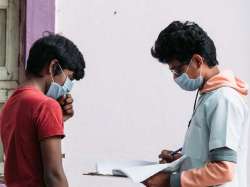Scientists develop AI model that can distinguish asymptomatic patients with healthy individuals
Now, asymptomatic COVID-19 patients can be distinguished from healthy individuals as scientists claim they have developed an artificial intelligence (AI) model that shows the results on an app that can be downloaded on smartphones.

Now, asymptomatic COVID-19 patients can be distinguished from healthy individuals as scientists claim they have developed an artificial intelligence (AI) model that shows the results on an app that can be downloaded on smartphones. According to the researchers from the Massachusetts Institute of Technology (MIT) in the US, the app analyses patients through their cough recordings. These differences are not decipherable to the human ear, but can be picked up by artificial intelligence, they said.
In a paper published in the IEEE Journal of Engineering in Medicine and Biology, the team described on an AI model that distinguishes asymptomatic people from healthy individuals through forced-cough recordings.
These recordings were submitted by people voluntarily through web browsers and devices such as cellphones and laptops, they said.
The researchers trained the model on tens of thousands of samples of coughs, as well as spoken words.
When they fed the model new cough recordings, it accurately identified 98.5 per cent of coughs from people who were confirmed to have COVID-19.
This included 100 per cent of coughs from asymptomatics -- who reported they did not have symptoms but had tested positive for the virus, according to the researchers.
The team is working on incorporating the model into a user-friendly app, which if approved and adopted on a large scale could potentially be a free, convenient, noninvasive pre-screening tool to identify people who are likely to be asymptomatic for COVID-19, the researchers said.
A user could log in daily, cough into their phone, and instantly get information on whether they might be infected and therefore should confirm with a formal test.
"The effective implementation of this group diagnostic tool could diminish the spread of the pandemic if everyone uses it before going to a classroom, a factory, or a restaurant," said Brian Subirana, a research scientist in MIT's Auto-ID Laboratory.
Prior to the pandemic's onset, research groups already had been training algorithms on cellphone recordings of coughs to accurately diagnose conditions such as pneumonia and asthma.
Similarly, the MIT team was developing AI models to analyse forced-cough recordings to see if they could detect signs of Alzheimer's, a disease associated with not only memory decline but also neuromuscular degradation such as weakened vocal cords.
In April, the team set out to collect as many recordings of coughs as they could, including those from COVID-19 patients.
They established a website where people can record a series of coughs, through a cellphone or other web-enabled device.
Participants also fill out a survey of symptoms they are experiencing, whether or not they have COVID-19, and whether they were diagnosed through an official test, by a doctor's assessment of their symptoms, or if they self-diagnosed.
They also can note their gender, geographical location, and native language.
To date, the researchers have collected more than 70,000 recordings, each containing several coughs, amounting to some 200,000 forced-cough audio samples, which Subirana said is "the largest research cough dataset that we know of."
The team used the 2,500 COVID-associated recordings, along with 2,500 more recordings that they randomly selected from the collection to balance the dataset.
They used 4,000 of these samples to train the AI model. The remaining 1,000 recordings were then fed into the model to see if it could accurately discern coughs from COVID patients versus healthy individuals.
The researchers were able to pick up patterns in the four biomarkers -- vocal cord strength, sentiment, lung and respiratory performance, and muscular degradation -- that are specific to COVID-19.
The model identified 98.5 per cent of coughs from people confirmed with COVID-19, and of those, it accurately detected all of the asymptomatic coughs.
"We think this shows that the way you produce sound, changes when you have COVID, even if you are asymptomatic," Subirana said.
(With inputs from PTI)